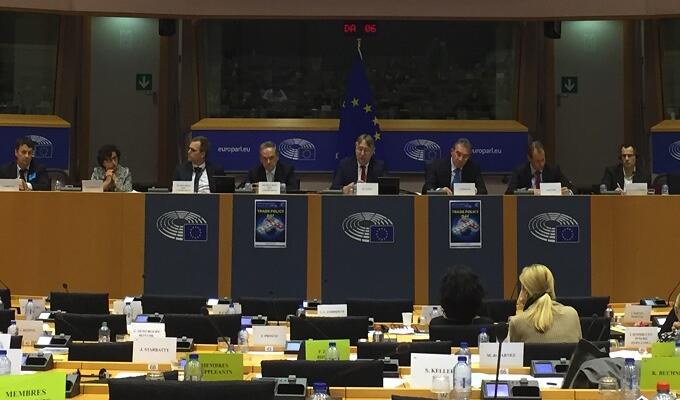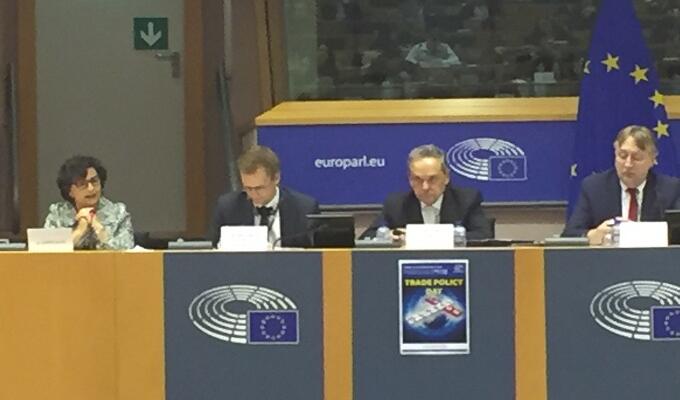

Striving for Legitimacy in Trade Policy
Brussels - 9 November 2016
Thank you for inviting me to be part of this thought-provoking discussion about the legitimacy of trade policy.
In democratic societies, open markets rest on a sort of social license. In several advanced economies, that license has become fragile. This crisis of legitimacy is both unfortunate and understandable.
Unfortunate because the open global economy has helped lift over a billion people out of extreme poverty. Predictably open markets made it possible for countries to hitch their wagon to the world economy and use external demand to pull people and resources out of subsistence activities into more productive work. The connection between open trade and rapid growth is not just relevant for developing countries like China, Kenya, and Vietnam: had trading partners slammed the door shut on West German exports the moment the new competition started to make them nervous, the term Wirtschaftswunder would never have entered our lexicon.
But unfortunate also because it ignores all that imports have brought us: greater purchasing power, expanded consumer choice, and the productivity gains arising from a more efficient reallocation of resources within the domestic economy.
And yet the angst is understandable. Understandable because back in the post-1989 heyday of globalization optimism, political and business elites did not pay enough attention to the fact that market opening would harm some people even while leaving society as a whole better off. The result was inadequate plans for adjustment. This is what I call the “when micro met macro moment”.
Understandable also because trade is a tangible symbol of far reaching economic changes in our societies, and trade agreements represent a specific government policy that people can oppose. This stands in stark contrast to what in reality has been the far greater driver of economic change in our societies, namely, technology.
Technology is the subject of no referenda, no last-minute parliamentary votes, no street protests. And yet it is automation, far more than trade, that has cost millions of relatively low-skilled people their factory and clerical jobs in advanced economies.
It is the ongoing technological revolution that is at once empowering people to connect to the modern global economy, and disempowering people by disrupting established business models, leading to social dislocation and unease.
A big part of rebuilding the legitimacy of trade policy thus has little to do with trade diplomacy itself. It has more to do with domestic social and economic policy. EU member states’ social policies do a good job of shielding people from destitution. That is not enough. The great political divide in advanced economies is no longer between left and right: it is between open societies and closed societies. And the fault line seems to be whether people are equipped to cope with socioeconomic change, and to seize new opportunities from technology and trade.
Political leaders at every level need to speak honestly and openly about the benefits and the costs of trade. For trade policy to be more widely seen as legitimate within the EU, you must take ownership of it, and put the days of ‘blame Brussels’ behind you.
That said, important work needs to be done within the trade arena. I will argue that this work should centre on inclusivity and sustainability.
Now that tariffs are low, with some notable exceptions, trade agreements operate primarily behind the border. Even in Europe, after decades of supranational cooperation going back to the Coal and Steel Community, this entry into what used to be the realm of national politics makes people nervous.
Voters want assurances that their governments will be able to regulate in the public interest. They want to feel secure that the food they eat, and the toys their children play with, are safe.
For trade policymakers, the challenge is to reduce the costs associated with meeting product standards and technical regulations, without compromising on their consumer protection objectives or their right to regulate.
Reducing the costs associated with trading goods and services would enable more commerce, specialization, and scale. It would be a fiscally responsible way of boosting growth.
But this agenda is also important for another reason: because exclusion from the benefits of the open global economy is not just a problem in advanced economies.
In fact, many developing countries still languish on the margins of the global economy, at least when it comes to trading in value-added goods and services. It is these countries - the so-called ‘bottom billion’ – that are home to large numbers of the world’s poorest people. Even within countries that register better trade performances, many groups of people at the ‘bottom of the pyramid’ have been unable to share in the gains.
Empowering these countries and communities to use international markets to drive growth and poverty reduction - in other words, making trade more inclusive worldwide - would do much to burnish the legitimacy of trade policy.
What does this entail? It means enabling small and medium-sized enterprises, which generate most jobs, to connect to international value chains for trade and investment.
Europeans know from experience that a globally connected SME sector can increase economic dynamism while fostering a more equitable distribution of the fruits of growth. Trade agreements that reduce fixed costs related to trade – from complex border procedures to the regulatory burden arising from product standards and certification requirements – would yield disproportionate gains for smaller firms both in Europe and elsewhere.
This is especially true for SMEs in developing countries. Research suggests the regulatory burden from non-tariff measures weighs twice as heavily on small companies’ exports than for their larger competitors. Inclusive trade means setting norms that are not unnecessarily complicated. It also means making the supply side investments to ensure that SMEs in developing countries are able meet the quality and safety demands of target markets and of lead firms in multi-country production networks.
Inclusive trade also means economically empowering women. When women earn an income, they re-invest a far higher share of it than men do into the health and education of their families. And yet women-owned businesses face a sort of double discrimination when it comes to trade. They must overcome all of the challenges other women entrepreneurs face, from discriminatory laws to unequal access to capital. On top of that, since the firms they run tend to be smaller, they are hit disproportionately hard by trade-related fixed costs. Even though women close to 40% of SMEs around the world, ITC survey suggest that they own only 20% of SMEs that engage in trade.
Another key to the legitimacy of trade policy is putting trade more visibly in the service of sustainability.
Consumers in developed and developing countries increasingly want ‘good trade’ – goods and services that respond to their personal priorities for social fairness and environmental protection. Companies have responded to this demand, giving rise to a plethora of voluntary sustainability standards and codes of conduct.
Such standards have the potential to foster more sustainable patterns of production and consumption – a key plank of the United Nations Sustainable Development Goals. At the same time, they create potentially lucrative price premiums for SMEs including in developing countries.
However, as with the regulatory demands of national governments or private value chains, voluntary sustainability standards involve costs associated with compliance and certification.
The setters of voluntary sustainability standards should strive to avoid needless duplication, and work to support compliance by smaller companies. A standard that locks out SMEs without providing them an on-ramp does not deserve to be called sustainable.
Dozens of agri-food companies, standard setters, government agencies, and non-governmental organizations have signed on ITC’s Trade for Sustainable Development principles, which set out some guidelines for ensuring that sustainability initiatives are worthy of the name.
In parallel with the development of sustainability standards, technology has made it possible to understand and track supply chains more accurately and affordably. ITC-led initiatives are working to leverage this visibility to make supply chains more sustainable in agriculture and now the textiles sector. Greater understanding of where their food and clothes come from can help consumers understand how trade benefits both them and producers.
I am happy to report that ITC will be working with the European Commission and Member States to help them track the evolution of fair and ethical trade markets. In 2018, one EU city will win the first Award for Fair and Ethical Trade, based on policies and practice to encourage purchases of sustainable products. Initiatives like this contribute to the legitimacy of trade policy by connecting trade, sustainability, and daily life in the public mind.
But making trade policy more inclusive and sustainable will not be enough. Trade policies need to be synchronised with European and domestic policies which will address the distributional impact of trade.
This means that trade must sync with investment in human capital, in education, skills and vocational training. It means using active labour market policies to soften the blow of unemployment. It means syncing trade with income-related policies on wage insurance, minimum wages and, why not, universal basic incomes. It means investing in innovation.
This will inevitably require taxes to be at the level needed to ensure we leave no-one behind. And since we are on this topic, it will also means curbing tax avoidance, including through international cooperation.
The list is long and the synchronising challenging. But the experience of many members of the European Union shows that it can be done. Today it simply must be done.
In closing, I want to say that in your efforts to make trade more inclusive and sustainable, ITC stands ready to put our experience and expertise at your service.
Thank you for your attention.



